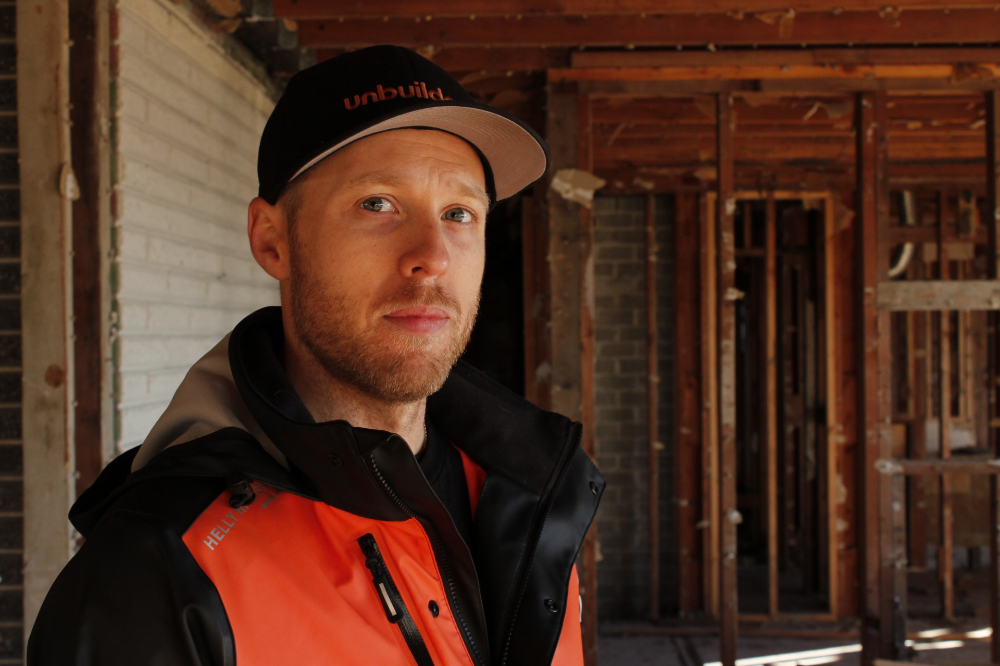A fire crackles in a North Vancouver hearth, heating the bare room on a chilly December morning.
The house is being demolished, and work crews have taken three weeks to strip it down to its Douglas fir frame. It has already been tested for hazardous materials. The appliances have been wheeled away, and everything from the copper wiring to the floorboards has been ripped out.
In a traditional demolition the next step would be to rip apart the frame and recycle the lumber by chipping and burning it for fuel.
But that, according to a Vancouver company, is a waste of valuable resources.
“This frame isn’t from your spindly little spruce trees we’re cutting down today,” said Adam Corneil, co-founder and CEO of Unbuilders. “These were 500- to 1,000-year-old trees, the big monsters we rarely cut today and rarely even see.”
In Vancouver, old growth lumber was used to build the frames of houses up until the 1970s, Corneil told The Tyee.
And now, as some 3,000 homes are being torn down in Metro Vancouver each year, the material is being sent to landfill or, in the case of the lumber, being burned for heat or energy.
“It’s really not waste — it is wasted. This is all reusable material,” Corneil said, gesturing around the home.
Corneil launched Unbuilders in January as an alternative to traditional demolition companies. The company “unbuilds” the home by hand, salvaging all possible materials as they go and donating them to charity to be reused.
Their current record for a single home is 96.8 per cent of materials salvaged or recycled and diverted from the landfill, Corneil said.
Metro Vancouver estimates an average single-family home, by weight, to be around 44 per cent wood, 25 per cent concrete and asphalt, and three per cent metal. When that average home is torn down it creates 50 tonnes of waste.
And 40 per cent of the waste going into landfills around the Lower Mainland is from construction and demolition, according to a report by the City of Vancouver.
“Every demolition contractor says they deconstruct homes but they don’t — they recycle homes,” Corneil said.
Contractors must recycle plaster and drywall, and there is a ban on dumping “clean,” or untreated, unpainted and unstained wood, in the landfill. So most contractors “recycle” the wood by taking it to a depot to be chipped and burned for fuel, said Corneil. Materials like concrete and asphalt are easily recycled and reused in new projects, he added.
Materials salvaged by Unbuilders can include everything from the patio railings to the doors and from the plumbing pipes to the lumber frame. All materials they salvage are donated to the Greater Vancouver Habitat for Humanity’s ReStore.
The company’s projects are like construction in reverse and finish when the final pallet of wood is loaded onto a flatbed truck and shipped to the ReStore.
Almost everything in the North Vancouver home, built in 1960, will be reused, except for small things like the vinyl patio flooring or the asphalt roofing shingles.
It’s a “real tragedy” to see lumber from a tree that grew for 1,000 years ripped apart by a machine as part of a demolition, Corneil said.
“When [co-founder Tony Pantages and I] came up with the idea of Unbuilders, I really saw it as mining a resource… And it’s a resource that hasn’t been mined in any sort of serious level for the last 80 years.”
The lumber salvaged from these homes is rarely reused for the frame of a new home. Lumber used in homes today requires a stamp to verify its structural quality, but those were rarely used before 1960. So despite salvaged lumber being up to three times stronger than new wood, there are barriers to its use, Corneil said.
The original idea was to have the lumber approved for reuse in framing.
But the salvaged materials are now being snatched up for different projects by everyone from artisan carpenters to chicken coop makers, explained Suzanne Fruson, Habitat for Humanity Greater Vancouver’s ReStore director.
Unbuilders partnered with two charities, Habitat for Humanity and The ReUse People of America, to come up with a way to be cost competitive with traditional demolition companies.
The salvaged materials are donated to Habitat’s ReStores and The ReUse Homeowners are then helped to access tax credits for their donation.
Once the materials are salvaged, the total donated materials are appraised and the homeowner gets a 29-per-cent federal tax credit and a 14.7-per-cent provincial credit, said Ted Reiff, president of The ReUse People.
Traditional demolition costs around $35,000, and Unbuilders costs around $45,000, said Corneil. But the tax credits for homeowners range from $25,000 to $185,000, so unbuilding can mean big savings.
Vancouver is also using financial incentives to make demolition less wasteful. The Green Demolition Bylaw requires demolition companies to recycle 75 per cent of materials from all homes built before 1940. That has diverted 40,000 tonnes of materials from landfills since its introduction in 2014, according to a city report.
In January, the bylaw will be amended so homes built before 1950 must be 75-per-cent recycled. Heritage homes built before 1950 and all homes built before 1910 must be deconstructed with a minimum of three tonnes of wood salvaged.
Every project requires a $14,600 security deposit, and if companies recycle less than 75 per cent of the home, they lose half their deposit. This is expected to divert another 8,000 tonnes of material from the landfill each year, according to the same report.
While Corneil views the amendment to the Green Demolition Bylaw a small step forward, he stresses how salvaging and reusing wood is always better than recycling it.
“Demolition companies are doing the exact same process as before — they’re just dumping their loads at wood chipping facilities versus the landfill,” he said.
Corneil doesn’t believe Unbuilders is in direct competition with traditional demolition companies — their machines are still needed to rip out concrete foundation, for example. Instead he is working towards a future where Unbuilders would be called in to deconstruct and salvage the frames of the houses alongside other demolition contractors.
If municipalities really want to reduce the waste created by the demolition industry, they should introduce a minimum quota for salvaged and reused materials to be fed back into new projects, said Corneil. ![]()
Read more: Labour + Industry, Housing, Environment

















Tyee Commenting Guidelines
Comments that violate guidelines risk being deleted, and violations may result in a temporary or permanent user ban. Maintain the spirit of good conversation to stay in the discussion.
*Please note The Tyee is not a forum for spreading misinformation about COVID-19, denying its existence or minimizing its risk to public health.
Do:
Do not: